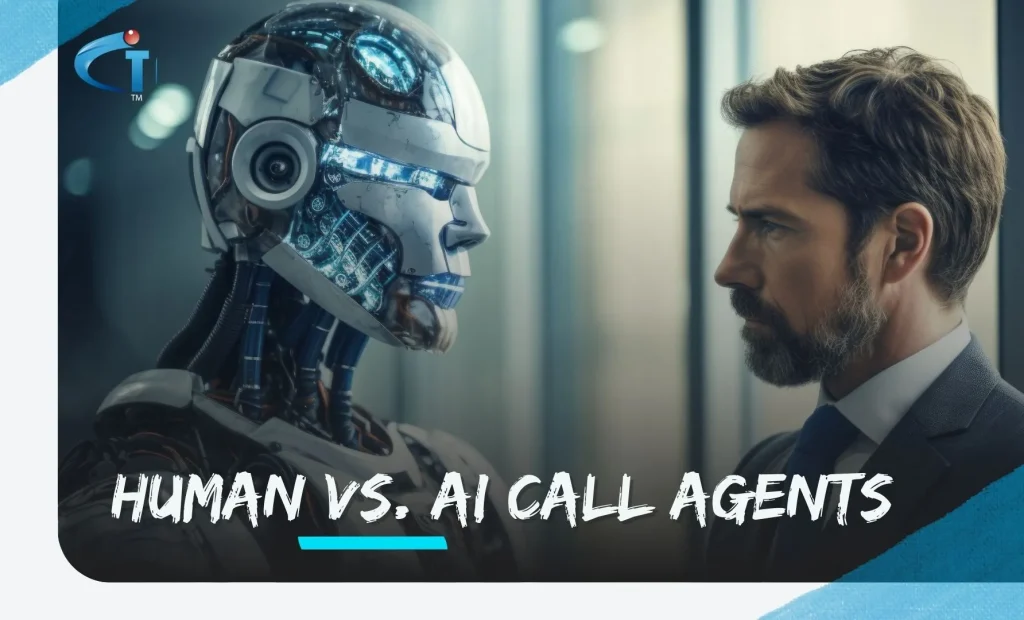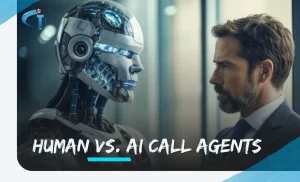When it comes to delivering exceptional customer experiences, the debate between Human vs. AI call agents is heating up. Both options offer unique strengths, and businesses are increasingly exploring how to strike the right balance. Are AI call agents the future of support, or will human interaction always reign supreme? Let’s break it down.

Introduction
Customer service is the backbone of any successful business. This is especially true in an era where immediate responses and personalized experiences are non-negotiable. The question of Human vs. AI in call centers pits the empathy of humans against the efficiency of technology. With the rise of AI in customer support, companies now face a decision that could shape the future of their customer care operations.
But do businesses really have to choose one over the other? This blog explores the capabilities of both human call agents and AI call agents to help answer one key question: Who’s the real MVP of customer service?
Understanding Human and AI Call Agents
What Are Human Call Agents?
Human call agents are the frontline staff trained to handle customer inquiries via phone, chat, or email. They excel in empathy, problem-solving, and understanding complex customer needs. For example, industries like healthcare and luxury services rely heavily on human call agents, as these scenarios often require high levels of trust and nuanced communication.
What Are AI Call Agents?
AI call agents, on the other hand, are sophisticated tools powered by technologies like machine learning and natural language processing (NLP). They automate repetitive tasks, resolve common queries, and are available 24/7. AI call agents can analyze large volumes of customer data to provide faster and more consistent customer support.
Stat Alert
A 2023 report revealed that 92% of businesses have implemented AI in customer support, citing improved response times and customer satisfaction as key benefits.
Key Differences at a Glance
| Feature | Human Call Agents | AI Call Agents |
| Availability | Limited to working hours | Available 24/7 |
| Response Speed | Context-specific, slower | Immediate, consistent |
| Complexity Handling | Excels in nuanced situations | Struggles with complex queries |
| Empathy & Emotional Intelligence | High | Limited |
| Scalability | Requires hiring more agents | Expands virtually instantly |
Strengths and Weaknesses of Each
Strengths of AI Call Agents
- Speed and Scalability
AI call agents process requests almost instantly and can handle high volumes simultaneously. For instance, they excel at tasks like password resets, FAQs, and appointment scheduling. - Cost-Effectiveness
AI requires an initial investment but drastically reduces operational costs over time compared to maintaining a large human workforce. - Data Utilization
AI can analyze behavior patterns to offer personalized solutions, enhancing the user experience with minimal effort.
Insight: A global study found that businesses using AI call agents reduced response times by up to 30%, boosting customer retention.
Strengths of Human Call Agents
- Empathy and Emotional Intelligence
When dealing with sensitive or high-stakes issues, human call agents provide the reassurance and connection customers crave. - Adaptability
Humans shine in unexpected scenarios, offering creative and flexible responses that AI systems cannot replicate.
Where Each Falls Short
- AI Call Agents struggle with complex queries and emotional interactions, which can lead to customer frustration.
- Human Call Agents are prone to errors and scalability challenges, especially during peak seasons.
Takeaway: Businesses that use both intelligently can mitigate these shortcomings.
The Winning Formula? Combining Forces
The real MVP of customer service may not be one or the other but rather the union of AI and human call agents. This hybrid approach leverages the speed and efficiency of AI with the empathy and problem-solving capacity of human agents.
Key Strategies for Success:
- AI for First-Line Support: Automate simple queries, while forwarding more complex calls to human agents.
- AI as an Assistant: Equip human agents with real-time AI suggestions during interactions.
- Seamless Handoffs: Enable AI to transfer customers to humans effortlessly, retaining full context to smooth the transition.
Real-World Example:
A leading telecommunications company reduced call resolution time by 40% using a hybrid model of AI-driven call routing and skilled human agents.
Internal link suggestion: For more tips on implementing automation, check out our AI Implementation Guide.
External link suggestion: Explore additional hybrid case studies at McKinsey’s Customer Care Insights.
Final Verdict and Call-to-Action
The bottom line is clear: the future of call centers lies in the collaboration between Human vs. AI call agents. Businesses that master this synergy will gain not only operational efficiency but also deeper customer trust. Remember, it’s not about replacing humans with machines; it’s about enhancing human capabilities with powerful tools.
Are you ready to take your customer support to the next level? Explore how our AI call agent solutions can transform your business today! Reach out for a free demo
FAQs
How does AI impact customer satisfaction?
AI enhances speed and availability but needs human reinforcement to handle sensitive cases.
Are human call agents becoming obsolete?
No. Human nuances and emotional intelligence remain irreplaceable by AI.
What industries benefit most from a hybrid call center?
E-commerce, healthcare, and financial services see the greatest ROI using combined human-AI solutions.

